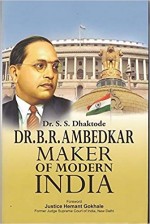Om Publications

Dr B R Ambedkar: Maker of Modern India
Dr S S Dhaktode
₹808 ₹950 (15% off)
ISBN 13
9789383206902
Year
2019
This book authored by Dr. S. S. Dhaktode which begins with Ambedkar's childhood, his early and higher education and family life, covers his varied contributions in different fields. The period of his higher education of at Columbia University in America and London School of Economic and Political Science in London was academically very fruitful period. At Columbia he did his M.A. and Ph.D. and at London school of Economic he completed his M.Sc. and D.Sc. degrees. “Problem of Rupee” was the Thesis he submitted for his D.Sc. degree. He studied Bar-at-Law at Gray's Inn in London where the British Philosopher and Statesman Francis Bacon who famously said, “Knowledge is power” also studied law there Columbia University awarded him honorary doctorate (LL.D.) in 1952 and Osmania University awarded him D. Lit. in 1953. This is described in Chapter 2. Ambedkar's family life, in brief, was full of pain and sufferings. (Chapter 3).
Dr. Ambedkar's greatest contribution in the emancipation of the Depressed Classes was his awakening of the masses from their slavery and slumber mainly through his trinity 'Educate, Agitate and Organize” (Chapter 4). Chapter 5 describes Dr. Ambedkar as a renowned economist who was the driving force behind the establishment of Finance Commission of India and Reserve Bank of India. Dr. Ambedkar introduced several land reforms suggesting industrialization of agriculture as a panacia for all agricultural ills in India. He thought that making India a Modern Nation, industrialization is inevitable (Chapter 7). Next Chapter discuss, in extension, several organization he founded in different fields : social, educational, political & religious.
Dr. Ambedkar, a renowned educationist, firmly held that education is a powerful tool for social reform. Through People's Education Society and Colleges established under its auspices, he served India in the cause of education (Chapter 9).
He had very enlightened views on politics; and along with these views, his political ideology is described in Chapter 10. His contributions in Labour legislation are discussed in Chapter 11. The next chapter Dr. Ambedkar approach to social justice through journalism is discussed, Dr. Ambedkar's contributions to water resources Development and to the formulation of India's new water policy are discussed in chapter 13 and 14 respectively. Chapter 15 discusses describes Hindu Code Bill that Dr. Ambedkar drafted to transform India into an egalitarian society, but orthodoxy opposed it.
He undertook several social movements (Mahad Satyagraha and Kalaram Mandir Satyagraha ) as a symbolic fight against inequality; and labour movements through 'The Bombay Municipal Kamgar Sangh' which he established in 1934